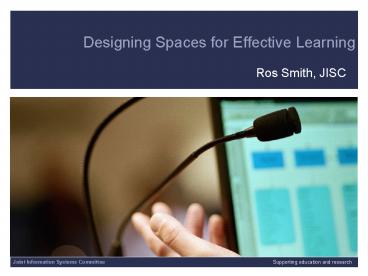11152009 Slide 1 PowerPoint PPT Presentation
Title: 11152009 Slide 1
1
Designing Spaces for Effective Learning
- Ros Smith, JISC
Joint Information Systems Committee
Supporting education and research
2
A guide to designing spaces for effective learning
- Launched at JISC Conference March 2006
- Focuses on the role and impact of technology on
physical learning space design in FE and HE - Builds on the JISC eSpaces Study, University of
Birmingham (2005) www.ldu.bham.ac.uk/espaces - Copies distributed UK-wide to Vice Chancellors,
Directors of Estates, of Library and Information
Services Media Services, and Heads of
e-learning and of Academic Practice - Also available from info_at_jisc.ac.uk
3
Designing Spaces for Effective Learning
- Takes readers on a walkthrough featuring
different types of space - Examines the role for technology in each space
- Brings issues relating to estates management,
space utilisation, pedagogy and technology into
one forum - Identifies some core principles for effective
practice - Provides case studies of refurbished and
new-build projects demonstrating vision and
innovation in embedding technology into learning
spaces
4
Designing Spaces for Effective Learning
- Identifies what is innovative and emergent, and..
- Provides architects floor plans for three types
of space based on current thinking general
teaching, vocational and learning centres - Explores the relationship between redesigned,
technology-rich spaces and learning potential
- Concludes with a checklist of key
points for senior managers - Spaces are themselves agents for change. Changed
spaces will change practice.
Image AMA Alexi Marmot Associates
5
Key messages from Designing Spaces for Effective
Learning
- Understanding what makes an effective design
is important. The best are likely to assist all
within the institution to work more productively
and to produce learners who are confident,
adaptable, and inspired to learn. - Designing Spaces for Effective Learning,
JISC 2006
6
Key messages from Designing Spaces for Effective
Learning
- Embedding technology into learning and
teaching spaces is likely to be an evolutionary
process rather than a revolutionary one. - Start by establishing your pedagogic aims,
then review the design and the technological
infrastructure in the whole institution. - To resolve what is the best way forward,
effective dialogues are needed to establish what
will be required from the spaces, what changes in
pedagogic approach are desirable and why.
Designing Spaces for Effective Learning, JISC
2006
7
Key messages from Designing Spaces for Effective
Learning
- Learning needs to be
- Pervasive
- Flexible
- Active
- Social
- Inclusive
And continuous
8
Key messages from Designing Spaces for Effective
Learning
- There can be no one blueprint for the design of
learning and teaching spaces - The concept of the learning centre is still
evolving , blending with other previously
distinct spaces to absorb more of their
functions. - Designing Spaces for Effective Learning, JISC
2006
9
Key messages from Designing Spaces for Effective
Learning
- Case studies show
- Increasing support for social, collaborative and
blended models of learning - More availability of audio-visual technologies
- Increasing hybridisation of spaces
- Flexibility in design, fittings and furniture to
ensure sustainability
10
Key messages from Designing Spaces for Effective
Learning
- In the future, we can expect to see
- Spaces designed to provide simultaneous support
for f2f and virtual learning - Spaces developed to support innovative,
experiential learning in f2f contexts - A higher profile given to social areas supporting
problem-solving and collaborative learning based
around mobile and wireless and audio visual
technologies - Greater emphasis on developing learners wider
skills, especially creativity and adaptability
Image University of Northumbria
11
Key principles for designing effective learning
centres
- We now expect that learning will involve many
different activities, each having different
behaviours associated with it - These varied purposes demand a clear vision for
each area provided for autonomous learning - The ultimate in flexibility large open plan
centres in which both learning and teaching take
place still presents challenges in management
of sound, heat and student activity - One solution the University of Warwicks
Learning Grid, a highly adaptable and highly
resourced space for collaborative group learning
with peer support
12
An example of a high-tech learning centre
Plan AMA Alexi Marmot Associates, Designing
Spaces for Effective Learning, JISC,2006
13
Key principles for designing effective learning
centres
- New priorities
- Supportive customer-focused approach
- Collaborative technology-enabled learning
- Wireless-enabled
- Self-regulating environment
- Flexible furniture
- Re-think of space allocation
14
Key principles for designing effective learning
centres
- An educational building is an expensive long-term
resource. The design of its individual spaces
needs to be
15
Key principles for designing effective learning
centres
- Flexible to accommodate both current and
evolving pedagogies - Future-proofed to enable space to be
re-allocated and reconfigured - Bold and creative to look beyond tried and
tested technologies and pedagogies and to
energise and inspire learners and tutors - Supportive to develop the potential of all
learners - Enterprising to make each space capable of
supporting different purposes
16
Final words
- The design of our learning spaces should
become a physical representation of the
institutions vision and strategy for learning
responsive, inclusive, and supportive of
attainment by all. - Designing Spaces for Effective Learning,
JISC, 2006
17
Designing Spaces for Effective Learning
- Give your comments on Designing Spaces for
Effective Learning. A feedback form can be
downloaded from www.jisc.ac.uk/eli_learningspaces.
html - To order copies, email info_at_jisc.ac.uk
18
Further information
- s.knight_at_jisc.ac.uk and ros.smith_at_gpisolutions.co
.uk - Web
- e-Learning and Innovation - www.jisc.ac.uk/elearni
ng_innovation.html - Designing Spaces for Effective Learning -
www.jisc.ac.uk/eli_learningspaces.html - Designing Spaces for Effective Learning
www.jiscinfonet.ac.uk/infokits/learning-space-desi
gn - Mailing List
- Pedagogy and Innovation mailing list -
eped-info_at_jiscmail.ac.uk

